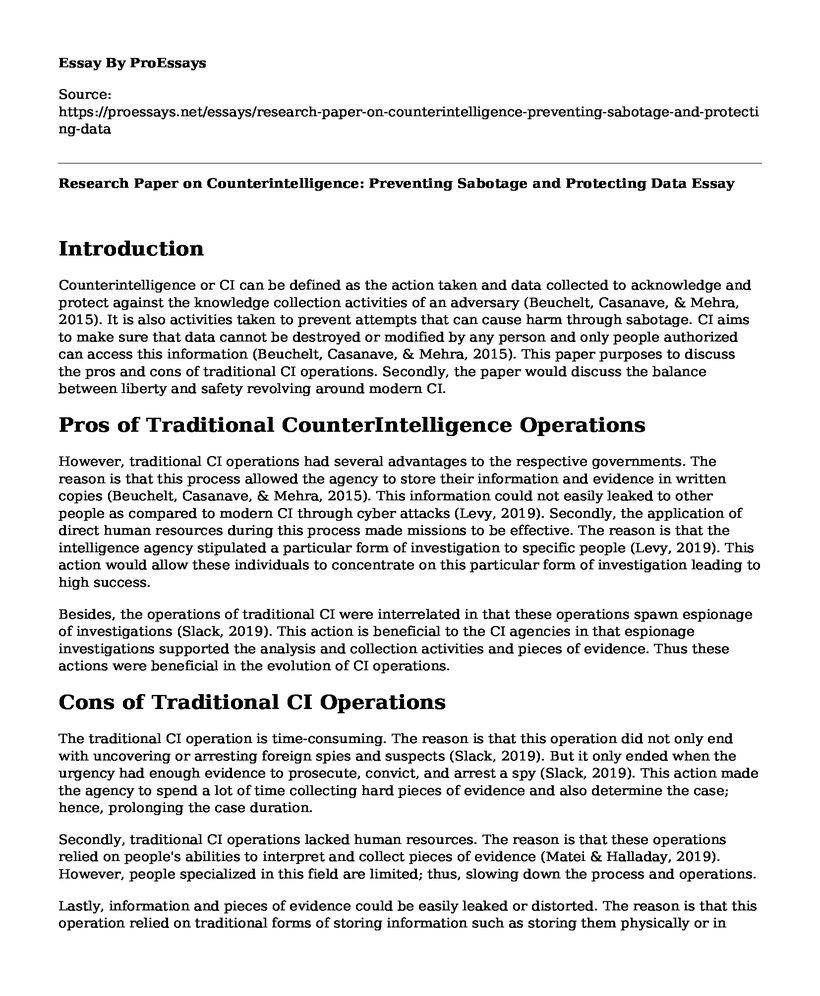Introduction
Counterintelligence or CI can be defined as the action taken and data collected to acknowledge and protect against the knowledge collection activities of an adversary (Beuchelt, Casanave, & Mehra, 2015). It is also activities taken to prevent attempts that can cause harm through sabotage. CI aims to make sure that data cannot be destroyed or modified by any person and only people authorized can access this information (Beuchelt, Casanave, & Mehra, 2015). This paper purposes to discuss the pros and cons of traditional CI operations. Secondly, the paper would discuss the balance between liberty and safety revolving around modern CI.
Pros of Traditional CounterIntelligence Operations
However, traditional CI operations had several advantages to the respective governments. The reason is that this process allowed the agency to store their information and evidence in written copies (Beuchelt, Casanave, & Mehra, 2015). This information could not easily leaked to other people as compared to modern CI through cyber attacks (Levy, 2019). Secondly, the application of direct human resources during this process made missions to be effective. The reason is that the intelligence agency stipulated a particular form of investigation to specific people (Levy, 2019). This action would allow these individuals to concentrate on this particular form of investigation leading to high success.
Besides, the operations of traditional CI were interrelated in that these operations spawn espionage of investigations (Slack, 2019). This action is beneficial to the CI agencies in that espionage investigations supported the analysis and collection activities and pieces of evidence. Thus these actions were beneficial in the evolution of CI operations.
Cons of Traditional CI Operations
The traditional CI operation is time-consuming. The reason is that this operation did not only end with uncovering or arresting foreign spies and suspects (Slack, 2019). But it only ended when the urgency had enough evidence to prosecute, convict, and arrest a spy (Slack, 2019). This action made the agency to spend a lot of time collecting hard pieces of evidence and also determine the case; hence, prolonging the case duration.
Secondly, traditional CI operations lacked human resources. The reason is that these operations relied on people's abilities to interpret and collect pieces of evidence (Matei & Halladay, 2019). However, people specialized in this field are limited; thus, slowing down the process and operations.
Lastly, information and pieces of evidence could be easily leaked or distorted. The reason is that this operation relied on traditional forms of storing information such as storing them physically or in safes (Matei & Halladay, 2019). These pieces of evidence could be easily accessible to various individuals as compared to modern CI operations where information are being encrypted at can only be accessible to specific individuals (Matei & Halladay, 2019).
The Balance between Liberty and Safety
Safety and liberty are two essential components that are emphasized in modern CI. These agents are given the power to reject operations that would adversely affect their lives. This power of determining whether to carry out an activity; for example, in the case of counter-terrorism is an expression of liberty (Matei & Halladay, 2019). Besides, modern CI has come up with the environment that attempts to strike a balance between upholding civil liberties and attaining safety (Jaquire & von Solms, 2017). The reason is that people be it suspects and agents are supposed to have their rights intact while undergoing investigations. Thus, the agency is always advised to protect its human resources and suspects at any given point by allowing them to make decisions that do not in fridge their rights to liberty and freedom of security and safety.
References
Beuchelt, G., Casanave, C., & Mehra, V. (2015). Advances in Operational Risk and Threat Modeling. National Cybersecurity Institute Journal, 33.
Jaquire, V., & von Solms, S. (2017, June). Cultivating a cyber counterintelligence maturity model. In ECCWS 2017 16th European Conference on Cyber Warfare and Security (p. 176). Academic Conferences and publishing limited.
Levy, D. (2019). In the Wilderness of Counterintelligence: CIA, the Force, and the Leslie James Bennett Matter. International Journal of Intelligence and CounterIntelligence, 32(4), 790-804.
Matei, F. C., & Halladay, C. (2019). The Conduct of Intelligence in Democracies: Processes, Practices.
Slack, K. C. (2019). EOKA Intelligence and Counterintelligence. International Journal of Intelligence and CounterIntelligence, 32(1), 82-119. Retrieved on 6/9/2019 from https://www.tandfonline.com/doi/abs/10.1080/08850607.2018.1522228
Cite this page
Research Paper on Counterintelligence: Preventing Sabotage and Protecting Data. (2023, Feb 06). Retrieved from https://proessays.net/essays/research-paper-on-counterintelligence-preventing-sabotage-and-protecting-data
If you are the original author of this essay and no longer wish to have it published on the ProEssays website, please click below to request its removal:
- Linear Programming Case Study
- Ethical Hacking as a Means of Improving Cybersecurity
- Research Paper Example on Summary of Google Inc
- Essay Example on Modern Technology: Testing and Teaching in Linguistics
- Essay Example on Software Dev Methods: Key to System Use
- Essay Example on Fighting Terrorism and Cybersecurity: An Analysis of US Measures
- Configuring DHCP Server on Windows Server 2016: Step-by-Step Guide - Report Sample







